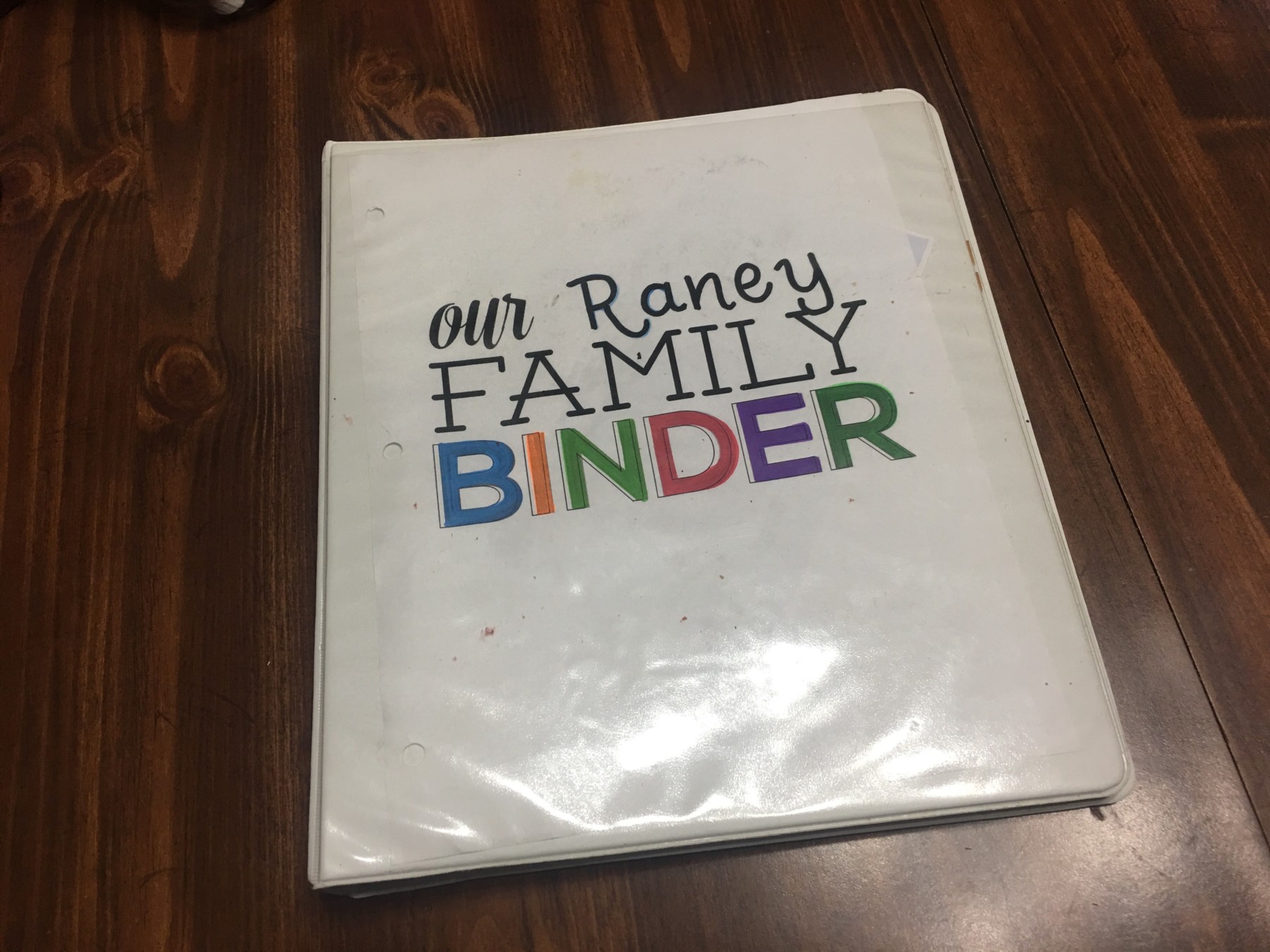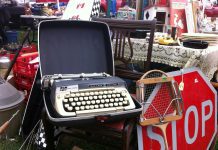Preparing for a Hurricane With Kids
Is your family ready to pick up and go if there’s a hurricane in the Gulf of Mexico? Do you have a hurricane evacuation plan? Preparing for a hurricane with kids can be overwhelming, which is why it’s best to get your storm plans ready when things are calm. My best piece of advice as a Louisiana mom is to make your family a hurricane binder. Truthfully, I think a family binder is a great idea for many scenarios, but it is absolutely essential for hurricane prep in my mind.
 Family Hurricane Plan :: Make a Binder
Family Hurricane Plan :: Make a Binder
Every year in advance of hurricane season I update our family binder with insurance info / phone numbers / cash and anything else that would be helpful if we are displaced for a while. Huh? Hurricane family binder you ask? Several years ago, my sister-in-law was evacuated in Isaac, by boat. It was crazy and chaotic and needless to say, very stressful, so after that experience, she put together a family binder and we followed suit! The original compiling can be daunting, but now we just update as needed each season. Each kid has a printed ID card that is laminated, in case we’re separated for some reason. Our family binder is kept in a handy place so we can grab it on the go without thinking too long about it.
Interested in making a family binder as part of your Lousisiana hurricane prep? We used this print out from Thirty Handmade Days Family Binder; I printed it at Kinko’s in black and white and went to town filling in all the information. We printed insurance policies (life, home, flood), we got medical records from the doctor, we looked up ALL THE PASSWORDS, and started adding cash every paycheck (this way it’s THERE and we don’t have to worry about ATM lines). Each year, as a hurricane approaches or we survive a near miss, I’m reminded to update our info and keep the binder current. All of our binder is in plastic sleeves, because Louisiana. Between floods, hurricanes, and the fact that Louisiana is all water — I’m hoping sleeves will help keep things dry).
 What Do I Need to Include in My Emergency Binder?
What Do I Need to Include in My Emergency Binder?
Emergency Contacts/Numbers
- Family & friends addresses and phone numbers
- Phone contact trees – if you have a contact tree for schools, church, friends and family, etc.
- Kids’ schools and day care centers
- Important business associates
- Doctors, dentists and local hospitals / clinics
- Business and work numbers and contacts
- Utilities – even if you have left home, you need a list of utilities in case you need to contact them for safe return dates, to report a problem or to inquire about your particular location during an emergency. This would include whomever runs your water, electricity, gas and propane.
- Local non-emergency numbers for police, fire, ambulance and city
Copies of vital documents
- Driver’s licenses or State Issued ID Cards
- Social security cards (or copies)
- Credit cards (front and back)
- Military Records
- Adoption / foster records
- Naturalization / Immigration documents
- Church records
Financial information
- Credit card numbers and phone numbers (plus websites and passwords)
- Insurance card numbers and phone numbers
- Bank Cards, accounts and phone numbers (plus websites and passwords)
Investments/401K/safety deposit information - Last two statements from all of your financial accounts – checking, savings, 401K, investments
Medical Information
- Advanced Care Directives
- Medical Power of Attorney
- Immunization Records
- Medical history if you have serious illnesses/diseases
- Insurance information – copies of your cards (front and back)
Legal Documents
- Power of Attorney for you
- Power of Attorney for others – if you’ve been given the POA for someone, it is vital to have it with you. While in most cases a copy isn’t a legally binding document, you may gain some leeway over having a copy in an emergency. Plan on keeping your original here.
- Deed and titles to your home and/or cars
- Birth certificates – you can order duplicate official documents from your state agencies
- Wedding licenses
- Wills – again, original documents are the only ones that are legally binding.
- Death Certificates – it may be important to keep a death certificate from a recently deceased family member – this is a judgement call for you.
- Passports
- Car Titles
- Lease information
Insurance
- Insurance Policy with local agent information
- Insurance cards if needed
- Home inventory – Keep copies of your home inventory if you have lost your home due to a localized emergency and need to go to a field office for your insurance company. While you should always have a copy of this (including on video/photos) that stays with your local insurance agent, keeping a copy for you to hand in during an emergency might get you on your way to recovery money faster.
Other
- List of vital websites and passwords – whether you run a business online, need to be able to get to an email address used by your family or local network.
- Your Emergency Plan – you’ve planned everything out with close family and friends. You’ve got a plan on who to call, options of where to meet, call signs for radios, but when you’re in a panic, it may be hard to keep everything straight. Have a plan printed out to refer to.
- Keys to your vehicles, house and storage spaces, plus keys to locations you’ll be going to in an evacuation if you have a designated spot (key to your parent’s house if you go there to ride out the storm.)
- Emergency ID cards in 4×6 cards that can be handy for emergency bags as well.
- Evacuation Checklist – your plan of attack for sudden evacuations. Don’t leave trying to remember what to take to your memory, especially if you haven’t drilled the process. In our moments of panic, we tend to lose our focus and our way. Being able to pull out your checklist will allow you to work with purpose and expediency.
- Maps — Local and regional map with planned escape routes. We’ve printed off maps from Google to include in our binder that include routes of our city, around our city to other check points. It saves the bulk of a full map which we keep in our emergency gear. We just duplicate the quick, important info here and laminate it to keep it clean and wrinkle free.
- Photos – Because we’re an all digital world now, people are less likely to print off their precious family photos. But even if you did, do you want to haul those boxes full of photos and scrapbooks if you have to evacuate? Better yet, scan them and put them on a thumb drive or two, and save all of your photos for a day when you can look again. You can also use photo page protectors to include a section in your binder not only for family memories, but identification, as well.
- Cash – While I advocate having an emergency bag for each member of your family that should contain cash, while also carrying cash on your person at all times, and having cash stashed in your car for emergencies, I feel it’s also important to have cash in your emergency binder. Because lives are uprooted during localized emergencies, you may only have one or two pieces of any of the important binders, bags, etc. to carry with you, so important things need to be duplicated in all of them. I’m not saying keep your entire life savings in your binder, but having a pencil case meant for a school binder full of some coins (for laundromats, vending machines, etc.) and small bills and larger bills (purchasing food gas and accommodations on the go).
All of this may sound like craziness to someone who hasn’t lived through a hurricane, but if you suddenly find yourself hundreds of miles from home without the ability to get back to your house, you will be so grateful to have a family binder. Prepare now for hurricane season and thank yourself later. It is always better to be safe than sorry.
View this post on Instagram




















Don’t forget the fur family members! Names, current pictures with descriptions, vet records (especially shot records), name/address and phone number for the vet, any medical issues/needs, and phone numbers of people the animals know in case something happens to you and they need care.